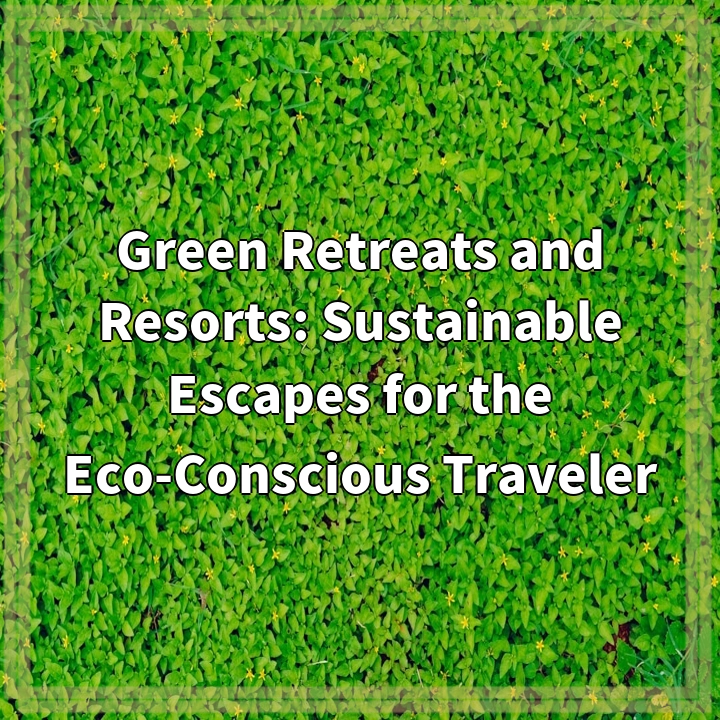
What it is:
Green retreats and resorts are accommodations designed to provide eco-conscious travelers with an experience that harmonizes with nature. These establishments focus on sustainability by utilizing eco-friendly practices, minimizing their carbon footprint, and promoting biodiversity. From solar panels and rainwater harvesting systems to organic gardens and locally sourced materials, green retreats aim to create a serene environment while preserving the natural surroundings. Visitors can enjoy the beauty of nature while knowing their stay supports sustainable tourism initiatives.
Real-World Problems:
Despite the growing popularity of green retreats and resorts, several real-world problems can impact their effectiveness and sustainability:
1. Greenwashing
One of the primary issues facing eco-friendly accommodations is greenwashing. Some resorts may falsely claim to be sustainable or eco-friendly without making meaningful efforts to reduce their environmental impact. This misrepresentation can mislead consumers who seek genuine eco-conscious options.
2. High Costs of Implementation
Implementing sustainable practices can be costly, especially for small or independently-owned resorts. The initial investment in energy-efficient technologies, waste management systems, and eco-friendly materials may deter some establishments from adopting these practices, reducing the availability of genuine green retreats.
3. Environmental Impact of Tourism
Even eco-friendly resorts can inadvertently contribute to environmental degradation. The influx of visitors can strain local ecosystems, lead to habitat destruction, and result in waste accumulation. Sustainable tourism practices are essential to mitigate these effects, but achieving a balance between visitor enjoyment and environmental preservation remains challenging.
4. Community Involvement
Successful green retreats often rely on the support of local communities. However, not all resorts prioritize community engagement, which can lead to economic disparities and social tension. Ensuring that local residents benefit from tourism activities is crucial for the long-term sustainability of both the retreats and the communities that host them.
5. Climate Change
Climate change poses a significant threat to the viability of green retreats and the ecosystems they depend on. Rising temperatures, extreme weather events, and shifting biodiversity can affect not only the natural beauty of these locations but also their operational sustainability. Resorts must continually adapt their practices to address the ongoing impacts of climate change.

Solutions for Sustainable Green Retreats and Resorts
Addressing the challenges faced by green retreats and resorts requires a multifaceted approach aimed at enhancing their sustainability while improving overall visitor experience. Here are some effective solutions:
1. Transparency in Marketing
To combat greenwashing, resorts should be transparent about their sustainability practices. Providing detailed information on eco-friendly initiatives and certifications can help consumers make informed choices. Clear communication about efforts and goals can build trust and credibility.
2. Financial Incentives for Sustainability
Governments and organizations can offer financial incentives to encourage small and independent resorts to invest in sustainable practices. Grants, tax breaks, and low-interest loans can alleviate financial burdens and promote eco-friendly upgrades such as renewable energy systems and sustainable infrastructure.
3. Sustainable Tourism Practices
Implementing sustainable tourism practices is essential for minimizing the environmental impact of visitors. This includes enforcing visitor limits, promoting eco-friendly activities, and educating guests on responsible behavior. Encouraging off-peak travel can also reduce strain on local ecosystems.
4. Community Partnerships
Green retreats should actively engage with local communities to ensure mutual benefit from tourism. Collaborating on economic initiatives, creating job opportunities, and supporting local culture can foster positive relationships between resorts and residents, enhancing overall sustainability.
5. Climate Resilience Strategies
Resorts must develop climate resilience strategies to adapt to the effects of climate change. This includes investing in infrastructure improvements, such as better drainage systems and climate-resilient landscaping, as well as engaging in local conservation efforts to protect ecosystems from further degradation.















